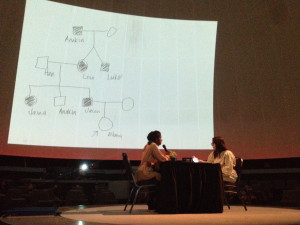Here is some feedback straight from practicing genetic counsellors…
1. Why did you decide to become a genetic counsellor?
“It was a field that required strong science and social (people) skills, and I’ve always had a interest in both.” –Deepti (graduated Sarah Lawrence College, 1999)
“I loved genetics but was not interested in lab research. This is a great career for people who love science but want to work directly with people.” –Cynthia (graduated University of British Columbia, 2007)
2. What do you enjoy most about being a genetic counsellor?
“Never being bored, as the field is constantly evolving and growing — and being able to help shape the field during the process.” –Deepti (graduated Sarah Lawrence College, 1999)
“As the science and technology develops rapidly, I am continually learning. There are lots of opportunities for personal and professional growth.” –Cynthia (graduated University of British Columbia, 2007)
3. What types of cases do you find most interesting?
“It’s not so much a specific “type” for me, but the ones I enjoy most are the ones where I’ve bonded with the people I’ve seen. That’s when I know I’ve made a difference and helped them.” -Deepti (graduated Sarah Lawrence College, 1999)
“Any type. For me, the most interesting part is seeing the different perspectives people have on the same information.” –Cynthia (graduated University of British Columbia, 2007)
4. Which graduate programs did you apply to? Did you have to reapply?
“Quite a few! It’s been a few years, so I can’t remember them all. No, I didn’t have to reapply.” -Deepti (graduated Sarah Lawrence College, 1999)
“I applied to UBC, U of T, McGill and Sarah Lawrence. I was lucky enough to get accepted on the first try.” –Cynthia (graduated University of British Columbia, 2007)
5. What did you find most difficult about the application process?
“The fierce competition; lots of applicants, not very many spots in the training programs.” -Deepti (graduated Sarah Lawrence College, 1999)
“The interviews! I did not have much experience with interviews and found the process quite intimidating.” –Cynthia (graduated University of British Columbia, 2007)
6. What were your interviews like? What types of questions did they ask?
“They were pretty general. Many questions were like #1 above. I do also remember being asked if friends naturally came to me to discuss their problems, as if I were an unofficial “counselling” resource for people.” -Deepti (graduated Sarah Lawrence College, 1999)
“I received 3 interviews. Two were panel interviews where you had a few people asking questions at once. The other was two back-to-back one-on-one interviews. Questions addressed my knowledge about and interest in the field, my strengths and weaknesses, and some challenging ethical dilemmas.” –Cynthia (graduated University of British Columbia, 2007)
7. What advice would you give to students interested in the genetic counselling field?
“Be open to learning and hearing people’s (sometimes unbelievable) stories, because you’ll be doing lots of it. And although it can be frustrating at times to shape a “new” field and break barriers, it is also rewarding to be a part of it.” –Deepti (graduated Sarah Lawrence College, 1999)
“Take the time to learn about the career. Talking to a genetic counsellor or pursuing shadowing opportunities in a genetics clinic are both great ways to do this.” –Cynthia (graduated University of British Columbia, 2007)
A huge thank you to these genetic counsellors for sharing their input!

A play involving the genetics if a famous space fantasy family.

